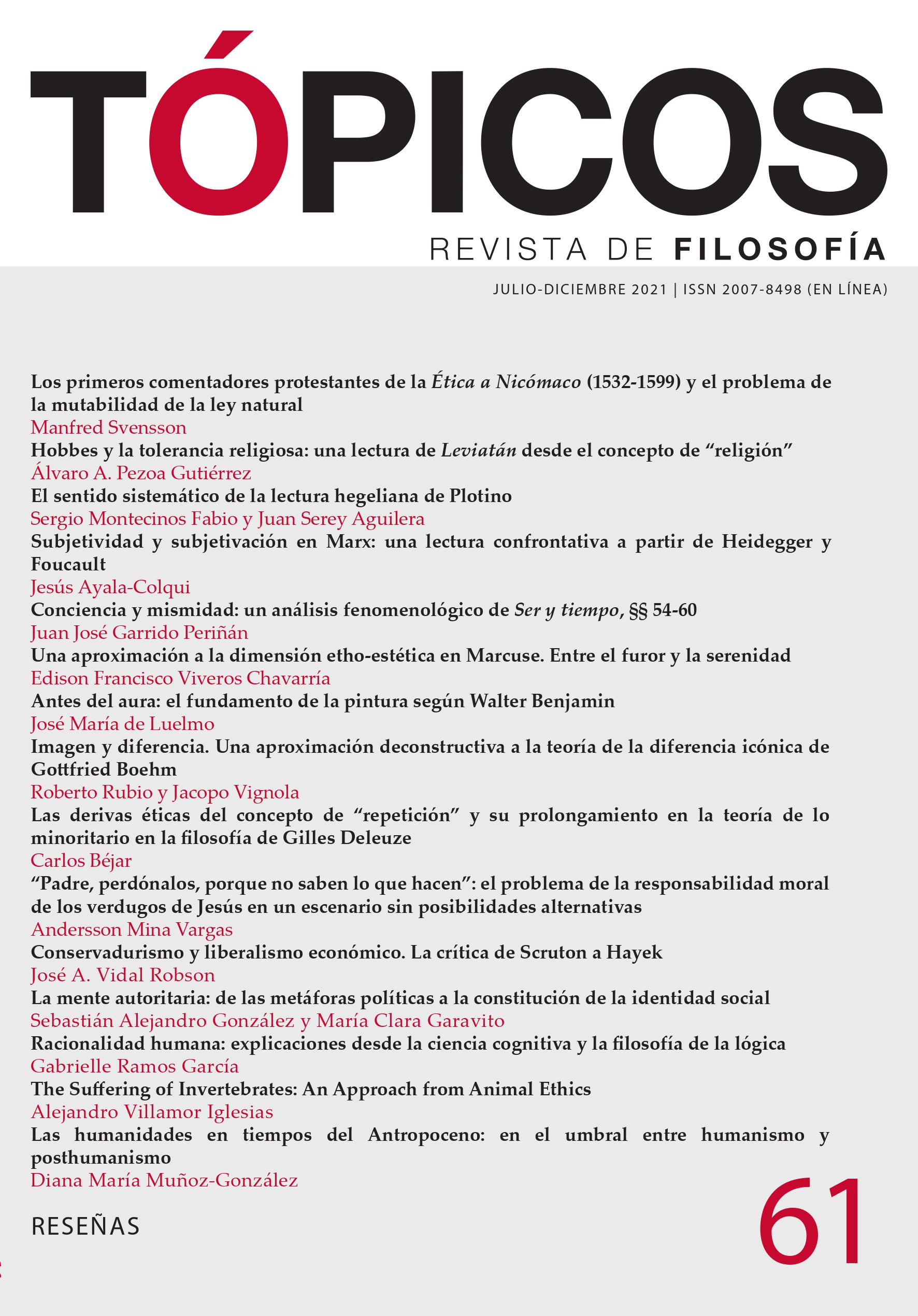Publicado 2021-06-23
Palabras clave
- responsabilidad moral,
- semi-compatibilismo,
- principio de posibilidades alternativas (PPA),
- máxima “deber implica poder” (DIP)
Derechos de autor 2021 Tópicos, Revista de Filosofía

Esta obra está bajo una licencia internacional Creative Commons Atribución-NoComercial-SinDerivadas 4.0.
Cómo citar
Resumen
Si se interpreta la condena y crucifixión de Jesucristo en clave de omnisciencia divina luterana y ausencia de posibilidades alternativas, surgiría una aparente contradicción en cuanto a la responsabilidad moral y los deberes de sus verdugos israelitas: ¿cómo sostener su responsabilidad moral si no contaban con posibilidades alternativas y si al parecer, de acuerdo con la primera palabra en la cruz, no sabían lo que hacían? Y ¿cómo atribuirles deberes que no podían cumplir? Esto se puede encarar desde una perspectiva semicompatibilista de la responsabilidad moral, y argumentar que: 1) la ausencia de posibilidades alternativas y la ignorancia no excluyen el que los verdugos puedan ser considerados moralmente responsables por la crucifixión de Cristo, y 2) la imposibilidad de cumplir con ciertos deberes no implica que los verdugos no tuviesen dichos deberes y que no puedan ser considerados moralmente responsables por su incumplimiento.
Descargas
Referencias
- De Aquino, T. (s. f.). Cadena aurea en los cuatro evangelios, san Lucas (23: 34-37), ad. Griego. URL: https://hjg.com.ar/catena/c0.html.
- Fischer, J. M. (1999). Recent Work on Moral Responsibility. Ethics, 110(1), 93-139. DOI: https://doi.org/10.1086/233206.
- Fischer, J. M. (2003). Ought-Implies-Can, Causal Determinism and Moral Responsibility. Analysis, 63(3), 244-250.
- Frankfurt, H. G. (1969). Alternate Possibilities and Moral Responsibility. The Journal of Philosophy, 66(23), 829-839. DOI: https://doi.org/10.2307/2023833.
- Frankfurt, H. G. (1971). Freedom of the Will and the Concept of a Person. The Journal of Philosophy, 68(1), 5-20. DOI: https://doi.org/10.2307/2024717.
- Frankfurt, H. G. (2003). Some Thoughts Concerning PAP. En D. Widerker y M. McKenna (eds.), Essays on Moral Responsibility. (pp. 339-345). Ashgate.
- Haji, I. (2014). Blameworthiness and Alternate Possibilities. The Journal of Value Inquiry, 48, 603-621.
- Humberstone, I. L. (1971). Two Sorts of ‘Ought’s. Analysis, 32(1), 8-11. DOI: https://doi.org/10.2307/3327274.
- Joyce, G. H. (1915). Invincible Ignorance. En J. Hastings (ed.), Encyclopedia of Religion and Ethics. Volume VII. (pp. 403-404). Charles Schribner’s Sons.
- Biblia Reina Valera Gómez. (2004). Biblia Hub. URL: http://bibliaparalela.com/.
- Lutero, M. (1969). De servo arbitrio (On the Bondage of Free Will). En E. G. Rupp y P. S. Watson (eds.), Luther and Erasmus: Free Will and Salvation. (pp. 101-332). E. G. Rupp, A. N. Marlow, P. S. Watson y B. Drewery (trads). The Westminster Press.
- Martin, W. (2009). Ought but Cannot. Proceedings of the Aristotelian Society, 109, 103-128.
- Mele, A. R. y Robb, D. (1998). Rescuing Frankfurt-Style Cases. Philosophical Review, 107(1), 97-112. DOI: https://doi.org/10.2307/2998316.
- Mele, A. R. y Robb, D. (2003). Bbs, Magnets and Seesaws: The Metaphysics of Frankfurt-Style Cases. En D. Widerker y M. McKenna (eds.), Moral Responsibility and Alternative Possibilities: Essays on the Importance of Alternative Possibilities. (pp. 107-126). Ashgate.
- Moya, C. (2003). Blockage Cases: No Case Against PAP. Crítica, Revista Hispanoamericana de Filosofía, 35(104), 109 -120.
- Patarroyo, C. (2015) Ought Without Ability. En A. Buckareff, C. Moya y S. Rosell (eds.), Agency, Freedom, and Moral Responsibility. Palgrave Macmillan.
- Pigden, C. R. (1990). Ought-Implies-Can: Erasmus, Luther and R. M. Hare. Sophia, 29(1), 2-30. DOI: https://doi.org/10.1007/BF02782712.
- Smith, H. (1983). Culpable Ignorance. The Philosophical Review, 92(4), 543-571. DOI: https://doi.org/10.2307/2184880.
- Vargas, M. (2005). The Trouble with Tracing. Midwest Studies on Philosophy, 29, 269-291. URL: http://vargasphilosophy.com/Papers/TracingPublished.pdf
- Widerker, D. (1991). Frankfurt on ‘Ought Implies Can’ and Alternative Possibilities. Analysis, 51(4), 222-224. DOI: https://doi.org/10.2307/3328762.
- Zimmerman, M. J. (1996). The Concept of Moral Obligation. Cambridge University Press.
- Zimmerman, M. J. (1997). Moral Responsibility and Ignorance. Ethics, 107(3), 410-426.





